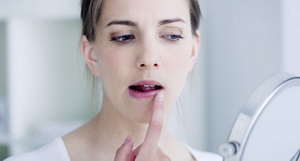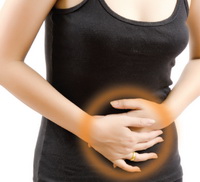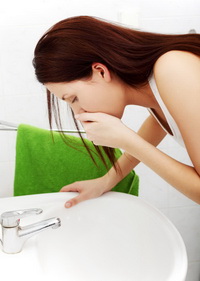Postpartum dry mouth and related syndromes:an introduction of postpartum dry mouth distention and fullness, blood thirst, and other related syndromes.
-
 ✵Gynecology of TCM is a branch to study the physiological and pathological characteristics of women and to prevent and treat syndromes specific to women. Gynecology of TCM research scope including irregular menstruation, amenia, metrorrhagia, infertility, postpartum syndromes, breast syndromes, and miscellaneous syndromes, etc.
✵Gynecology of TCM is a branch to study the physiological and pathological characteristics of women and to prevent and treat syndromes specific to women. Gynecology of TCM research scope including irregular menstruation, amenia, metrorrhagia, infertility, postpartum syndromes, breast syndromes, and miscellaneous syndromes, etc.
- Postpartum dry mouth and related syndromes.
-
✵The postpartum dry mouth syndrome is also known as dry mouth syndromes of women after childbirth, a series of dry mouth syndromes of women following childbirth. The related syndromes are other syndromes due to related or similar pathogenic reasons.
✧ In the TCM system, the pathogenic reasons for the postpartum dry mouth syndromes normally are deficiency of the Ying and Wei system(the nutrient Qi and defense Qi system), Qi and blood are unstable, eat too early, indigestion, etc. Common related symptoms observed are dry mouth, thirst, dry lip, etc. The related syndromes are understood due to similar reasons and also specific reasons, with different symptoms and specific symptoms observed.
✵The women dry mouth syndromes after childbirth, and dry mouth related syndromes are introduced: postpartum dry mouth distention and fullness, postpartum blood-thirst(postpartum thirst due to hemorrhage), postpartum thirst and difficulty in urination(dysuria, difficulty in micturition), postpartum abdominal distension fullness and oppression vomit, postpartum retching counter flow no appetite, etc.
- Postpartum dry mouth distention and fullness.
-

✵The postpartum dry mouth distention and fullness is a dry mouth distention and fullness following childbirth due to various pathogenic reasons. It is also known as dry mouth distention and fullness after childbirth.
✧ In the TCM system, the pathogenic reasons for the postpartum dry mouth distention and fullness normally are great deficiency of Ying and Wei system(the nutrient Qi and defense Qi system), Qi and blood are unstable, eat too early, indigestion, toxins accumulated in the stomach, flow upward and bind in the chest, lead to dry mouth and thirst, distention and fullness below the heart.
✵The postpartum dry mouth distention and fullness common types are known including:
✧⑴.Postpartum dry mouth distention and fullness, eat grain food, or sorrow and vexation at the interior, get hurt by external dryness and heat, drink and eat sweet, lead to dry mouth distention and fullness.
✧⑵.Postpartum dry mouth distention and fullness, vexation and irritable, or dryness heat of external heat, need to see which channels it belongs to.
✵The woman dry mouth syndrome is sometimes accompanied by pain in the throat, known as woman dry mouth with throat pain syndrome, or sometimes only pain in the throat, due to various pathogenic reasons.
✧ In the TCM system, the pathogenic reasons for the dry mouth with pain in throat syndrome normally are deficient fire from the triple energizer, or heat accumulation from diet and food source before childbirth, etc.
✵Ancient herbalists who hold a syndrome differentiation viewpoint with similar explain of pathogenic reasons, and the relevant representative work are introduced and quoted:"A woman suffers from pain in the throat, what is it? It is due to deficiency fire flow upward." [03].
"A woman suffers from fever after childbirth, dry mouth and thirst, dry lip cracked and grow out sore, what is it? This is the condition that she ever took much spicy and hot food, garlic and red pepper, chicken and fish, heat accumulated in the spleen and stomach, Qi going upward and affect the upper energizer..." [03].
"Dry mouth distention and stagnancy: the syndrome dry mouth distention and stagnancy, is due to extreme deficiency of blood and Qi, insufficiency of the middle Qi, take wheat food too early, the spleen and stomach could not digest it, toxins accumulated in the stomach, flow upward and affect in the chest, as this syndrome.
In case the woman's Zang-viscera Qi is deficient, also get affected by cold, abdominal distention and pains, vomit or throw up and nausea, reduced appetite(take less food and drink), also due to blood and Qi are sudden deficient after childbirth, affected by wind and cold pathogen, as a result, the cold pathogen is in domination endogenously, the old disease turns severe..." [05].
- Postpartum blood thirst(postpartum thirst due to hemorrhage).
-

✵Postpartum blood-thirst(postpartum thirst due to hemorrhage) is blood-thirst or thirst occurring following childbirth, due to various pathogenic reasons. It is also known as bloodthirst syndrome after childbirth.
✧In the TCM system, the pathogenic reasons for postpartum blood-thirst normally are the exhaustion of body fluid, heat due to blood and Yin deficiency.
✵Ancient herbalists who hold a syndrome differentiation viewpoint with similar explain of pathogenic reasons, and the relevant representative work are introduced and quoted:"Thirst after childbirth:...a woman loses excessive volume of blood after childbirth, exhaustion of body fluid internally, sudden deficiency of the stomach Qi, immediately generates endogenous heat, as a result, thirst, dry pharynx and thirst..." [05].
"Thirst after childbirth: a woman suffers from thirst after childbirth, (1).due to Qi deficiency and body fluid insufficiency...;(2).due to blood deficiency, ...in severe case, ..." [06].
✵The postpartum blood-thirst(postpartum thirst due to hemorrhage) common types are known including:
⑴.A woman suffers from postpartum blood thirst(thirst due to hemorrhage after childbirth), great thirst, incessant and unstoppable;
⑵...., blood thirst after childbirth, drink water frequently;
⑶...., blood thirst after childbirth, weak or lack of strength.
- Postpartum thirst and difficulty in urination.
-

✵Postpartum thirst and difficulty in urination(dysuria, difficulty in micturition) is thirst or thirst with difficulty in urination syndrome occurring following childbirth, other symptoms observed might include dry pharynx(dryness in the throat), dry thirst, due to various pathogenic reasons. It is also known as thirst and difficulty in urination syndrome after childbirth.
✧ In the TCM system, the pathogenic reasons for postpartum thirst and difficulty in urination syndrome normally are loss of blood, or much perspiration, lack of water and grains.
✵Ancient herbalists who hold a syndrome differentiation viewpoint with similar explain of pathogenic reasons, and the relevant representative work are introduced and quoted:"After childbirth, a woman suffers from thirst or thirst with difficulty in urination, mostly due to loss of blood, or much perspiration, is the condition lack of water and grains. For the water and grains consumed in daily life, received in the stomach viscus and transported by the lung and spleen viscus, the essence and clear Qi are transformed to body liquid, the Qi connect to the heart, affected by the fire and then transformed to blood, flow down to the urinary bladder and turn to urine, during the childbearing and loss of blood, much perspiration, strain and tiredness hurt the spleen, could not transporting body fluid for the stomach, the generating and transforming Qi not runs well, as a result, there is little body fluid flows upward, and suffers from dry pharynx dry thirst, the Qi at the lower not going upward and symptoms the stomach and kidney obstacles...should not understand dry pharynx is due to fire, ...should not understand that the difficulty in urination is water stagnancy(water retention)..." [02].
"Case after childbirth, a woman suffers from thirst, dry pharynx(dryness in the throat), or thirst and difficulty in urination. Other symptoms might be observed: much perspiration, chronic difficulty in defecation(chronic constipation), serious thirst." [02].
"Dry mouth with oliguresis(short of urine): lose blood after childbirth, or much perspiration, Qi deficiency and could not prompt fluid, ...as a result, body fluid does not flow upward, thirst and dry pharynx, the lower Qi is not ascending, difficulty in urination, or short of urine..." [05].Different type are introduced:
⑴.A woman suffers from the dry mouth with oliguresis(short of urine) after childbirth, much perspiration(much sweating), and loss of body fluid;
⑵...., in case no pain clots; ⑶...., in case very thirst; ⑷...., in case thirst and lack in strength; ⑸...., in case difficulty in urination, or with thirst.
- Postpartum abdominal distension fullness and oppression vomit.
-

✵The postpartum abdominal distension fullness and oppression vomit is a syndrome of abdominal distension fullness and oppression vomit occurring following childbirth, due to various pathogenic reasons. It is also known as abdominal distension fullness and oppression vomit syndrome after childbirth.
✧ In the TCM system, the pathogenic reasons for the postpartum abdominal distension fullness and oppression vomit normally are residue blood dissipated and flow into the spleen and stomach, affect the spleen, and the spleen lost its function of transforming essence, lead to distention in the abdomen, affect the stomach and the stomach could not accept food and water, and lead to throwing up or vomit. If it is misdiagnosed as normal distention and vomit, and treat as distention or vomit herbs, might hurt the positive Qi and it will be difficult to recover.
✵The postpartum abdominal distension fullness and oppression vomit common types are known including:
⑴.A woman suffers from postpartum abdominal distension fullness and oppression vomit, distention and fullness in the abdomen, oppression in abdomen and chest, vomit or throw up.
- Postpartum retching counterflow no appetite.
-

✵The postpartum retching counter flow no appetite is a syndrome of retching counter flow no appetite occurring following childbirth, due to various pathogenic reasons. It is also known as retching counter flow and no appetite syndrome after childbirth.
✧In the TCM system, the pathogenic reasons for the postpartum retching counterflow no appetite normally are hurt of Zang-viscera and Fu-viscera after childbirth, or Qi excess and affect the stomach and intestines, dryness of stomach and intestines leading to Qi counter flow, result in vomiting and throw up, no food intake.
✵Ancient herbalists who hold a syndrome differentiation viewpoint with similar explain of pathogenic reasons, and the relevant representative work are introduced and quoted:"The stomach viscus is a sea of water and grains. The essence of water and grains, transformed into blood and Qi, nourish and moistening the Zang and Fu-viscera. Strain and consumption hurt the Zang and Fu-viscera after childbirth, coldness pathogen easily invades and enters into the intestine and stomach viscus, as a result, Qi counterflow vomit and no appetite." [02].
"Case after childbirth, a woman suffers from retching counterflow, no appetite(do not take food).
Case after childbirth, a woman suffers from cough, retching counterflow, vomit, the heart is affected and dizziness.
Case over seven days after childbirth, a woman suffers from retching counterflow, no appetite(do not take food)." [02]."A woman suffers from a hundred syndromes(many) after childbirth, there are three serious syndromes among them, what are they? The three serious syndromes are vomit, diarrhea, night sweating. In the condition one serious syndrome is observed, it is not easy to treat, if all the three serious syndromes occurred, it is in risk conditions. Should treat the syndrome with serious symptoms first, and then for other syndromes." [03].
"A woman suffers from abdominal pain, vomit, and throw up after childbirth, due to residue lochia passing in less volume, residue blood invading the spleen by chances of deficiency, and lead to distention fullness, affect the stomach and vomit or throw up." [04].Different types are introduced:
⑴.A woman suffers from abdominal pain, vomit and throws up after childbirth, residue blood invading the spleen by chances of deficiency, distention fullness, affect the stomach and vomit or throw up;
⑵.A woman suffers from distention in the abdomen, vomit and throws up, is the case stomach incoordination(discomfort in the stomach);
⑶.A woman suffers from retching(dysemesia) and unstoppable, no appetite(do not want to take food or drink), is the case of stomach incoordination and weakness;
⑷.A woman suffers from vomit from deficiency cold of the spleen Qi, poor appetite, and pain in the abdomen;
✵The postpartum retching counterflow no appetite common types are known including:
⑴.Case postpartum retching counter flow no appetite, coldness in the spleen and stomach after childbirth, fullness and depression in chest and heart, vomit and retching counterflow, lacking strength in limbs, no appetite(no food intake).
⑵.Case postpartum retching counterflow no appetite, disorder of stomach-Qi, incessant vomit and throw up, no appetite(no food intake) at all.
⑶.Case postpartum retching counterflow no appetite, no other syndromes after childbirth, only vomit and throw up, no appetite(no food intake).
References:
-
- 01.Postpartum dry mouth and related syndromes:an introduction of postpartum dry mouth distention and fullness, blood thirst, and other related syndromes.
- 02.Jiēzhāi Gōng Tāi Chǎn Yī àn(Births Cases of Jie Zhai Gong).By 王纶(Wáng Guān)[Ming].
- 03.Fù Kē Bǎi Biàn(the Differentiations in Hundred Syndromes of Gynaecology).By 庄履严(Zhuāng Lǚyán)[Ming].
- 04.Ye Shi Nǚ Ke Zhèng Zhì(the Syndromes and Therapeutics of Ye's Gynaecology).By 叶桂(Yè Guì)[1817].
- 05.Fù Kē Bèi Kǎo(the References of Gynaecology).By 何应豫(Hé Yīngyù)[1820].
- 06.Fù Kē Liáng Fāng(the Effective Prescription of Gynecology).By 何梦瑶(Hé Mèngyáo)[1751].
